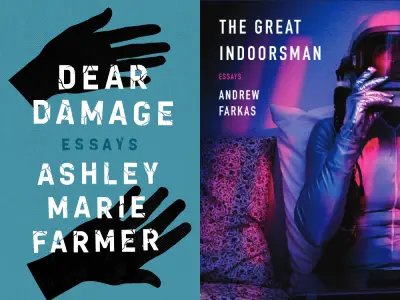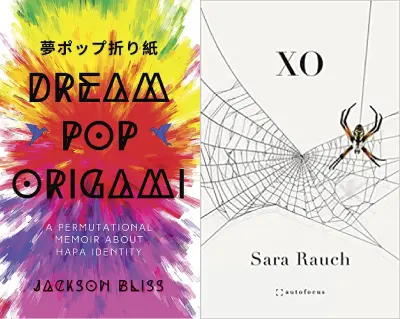Look, I have things to say about my experience consuming four nonfiction books this last month: The Great Indoorsman by Andrew Farkas, Dear Damage by Ashley Marie Farmer, XO by Sara Rauch and Dream Pop Origami by Jackson Bliss. And I will start by saying this:
The Great Indoorsman is the work of a true craftsperson and the phrasing and structure feels akin to architecture, all lines, angles and inspired thinking, leavened with a pop culture and extended cultural knowingness that left me smiling and nodding my head throughout.
Dear Damage caused me to repeatedly lose my breath, caught as I was between my desire to see what would happen next, and how it was going to happen, as well as wanting to know more about the ideas, decisions and characters—especially their lives before this—that graced the pages before me.
XO is a distillation, a deconstruction and a series of lyrical gut punches which explicate how we connect, and full-stop, how one cheats, the gnawing feelings of stability and decency that linger even as one is overwhelmed by a sense of attraction and a desire to wreck things too strong to resist.
Dream Pop Origami, sigh, and how irresponsible yet perfectly factual it would be to leave this brief reaction at sigh, because that’s how I felt sentence to sentence, my reaction as cellular as anything, a response to something so intimate and present I wondered if the author and I are friends (we’re not, yet).
I start with all that because I’m certain that I want to say something more here about the choices we make, and don’t, big and small, though also about the choices the people around us make and how we deal with those. I’m sure there’s something to say about identity too, and again, choices, though not always ours. Also, how things get fragmented. That we have to figure out how we choose to tell our stories. Though also something about our paths, or mine, as related to others, especially the paths followed in these books.

First though, I once had this blog called This Blog Will Change Your Life. I still do, sort of. But it was different then, it was a literary blog written with the intention to promote my work and the work of those I loved. At least the work I loved. I share this because at the time I also traveled for work, a lot, and when I traveled, and as I moved between trains, cabs, airplanes, hotel rooms, coffee shops, bars and restaurants, I read a lot of books, and then I wrote about those books on the blog. These weren’t reviews per se, they were riffs, associations and celebrations, and I framed these pieces through the prism of what was happening in my life at the time, a lot of which involved travel, reading, coffee shops, writing, hotels, reading, and bars, rinse, repeat. That job is long gone and I don’t travel like that anymore. Most of us don’t, not recently, not with COVID. And I’ve missed it. Badly. Both the travel and the excessive reading. Until this summer, when I was asked to do a gig in Montana in June that had been postponed for the last two years, and I needed to fly to California first for a family thing. I was excited about all of it, being in motion, taking trains, sleeping in hotels, hitting bars and coffee shops. I was also quite excited to read like mad. Which I did.
I traveled to California.
I read.
I traveled to Montana.
I read
I got COVID.
Night sweats.
Fatigue.
I read.
The last two months have been an extended fever dream, a weird mix, of reading, writing, working, lethargy and a desire to just stay in bed and sleep. A person slow to motivate, slow to do anything, and nothing like I think of myself. Which makes the books I’ve been reading as great as they all are even more interesting.
One thing that unites these books beyond the quality of the work is that all four authors have pursued similar paths all so different than mine: they are academics and intellectuals, focused on learning and teaching, attending writers retreats and residencies, pursuing work in colleges and traveling to find it. They’re not all in the same places now, but where they were, and mostly are, is so different than the 9-5 path I toiled on for so long. As I read their books, even when I read about their struggles, their poor choices, and the choices of others, poor and otherwise, that affected them, I was jealous of how they lived. The chances they took, the adventures they pursued. Their mistakes.
I was also jealous of how beautifully they write about them.
“You need to let in a little light,” he says about this book. This is it, this essay, as best as you can tell. But what’s the brightness without shadow? Because the shadows were an element, too. And maybe the reason that something that started as a dare has endured. You’ve never given hard-won happiness enough credit, always chalking it up to luck.
–“Second Person,” Dear Damage, page 160
Farmer writes about a tragedy that may not be a secret, much less a spoiler were I to mention what it is, but I won’t, I want to feel like I’m being withholding here, so as to make you go find out what happened in her life by reading the book yourself. The book does have a lot of darkness, but there is much more light in its pages beyond this essay. Maybe I’m projecting that onto the book because I’ve met Farmer and she exudes so much light, but I hope you read the book, immerse yourself in the interviews, her marriage, her desire to create and then tell me how the tragedy at the center of all this is leavened by her mere presence around it. The tragedy saturates who she is, but it’s not what she is, it isn’t her identity. Her identity is that of the writer, probing, searching, and making art from horror.
A good story, a necessary story, doesn’t need to be factual to tell the truth. This story, this yarn I’m spinning the way the Grandmother Spider spins a web to steal the sun in Cherokee legend, is not entirely factual, but it is true…Grandmother Spider was able to carry the sun across the world in a clay pot, bringing light and fire where there was once only darkness.
- XO, page 49

Again light, and for Rauch, the story of this affair, the relationship she was in when it began, how these things end and become something new, a creative life, and a recognition of what she needs from that life is all necessary to be written about, explore and shared. Rauch sheds light on all this because that’s what writers do, we bring light to the stories that ping around in the recesses of our brain and must be released, the written word and the page our outlets and clay pots. One thing I love about XO is Rauch’s commitment to the story and her absolute resistance to flinching as she tells it. We may judge her, and she may judge herself, but it’s her story, and who she is, and it’s all laid out before us to lose, and find, ourselves in should we choose to.
Words like their inventors, have serious limitations and those limitations define the inventors in tragic and fatal ways. Yet despite its intrinsic fragility, promiscuity, and ambiguity, language is a clumsy bomb we drop in our own primordial state of helplessness to gain the upper hand in our communication with the void.
- Dream Pop Origami, page 117
Bliss loves words and this memoir twists and arranges them into an endless journey about somehow trying to understand who and what he is. This journey is particularly focused on his Hapa identity, and how to make sense of and embrace it, but it’s also about how to manage the neglect and sheer pleasure life has heaped on him from the start. We will learn his favorite words, video games and albums, his great love for his wife, his feelings about Chicago, graduate school, speaking French, class and race, but we will also learn about the impact of the many fucked-up choices his parents made, the beginning and legacy of his maternal grandmother’s marriage, and how that impacts those choices his parents made—his mother’s anyway—and what it means to be alive at all. It’s an explosion of words, thoughts, needs and dreams, joys that are wondrous and beautiful, and of a piece with all of these works. Bliss has things to say and he’s going to share all of them with us.
I told them (Farkas’ students) that although it approaches the topic, Waiting for Godot isn’t about nothing. It’s about the fact that people are constantly waiting for someone to deliver them from their situations, when they should actually do something themselves…And now I tell you this essay isn’t about nothing. Because everything is about something, and never about nothing, no matter how hard we try.
–“An Essay About Nothing,” The Great Indoorsman, page 117
And so it is that Farkas writes about everything, or maybe just so many things I love, bars, movies, pool halls, romance, video stores, the alarm clocks that people set in their hotel rooms and do not turn off when they check out, and on and on in the best way. Farkas has the gift of making perpetual connections between all things, carefully drawing the through lines, and seemingly enjoying the act of writing so much we have to believe that some part of his identity is the conscious choice to find joy in the exploration of all things that cross his mind, his path and this thing we call life.
Which is what all of this is about, the travel, the fever dreams, the search for identity, the reading and the writing. It’s about wanting to be who we are, better understand how we got here, and to live the best version of all that we can. Which is also to say, we may not pull any of that off, but we can always write about it.
Get The Great Indoorsman at Bookshop or Amazon
Get Dream Pop Origami at Bookshop or Amazon
Get Dear Damage at Bookshop or Amazon

About the author
Ben Tanzer is an Emmy-award winning coach, creative strategist, podcaster, writer, teacher and social worker who has been helping nonprofits, publishers, authors, small business and career changers tell their stories for 20 plus years. He is the author of the soon to be re-released short story collection Upstate and several award-winning books, including the science fiction novel Orphans and the essay collections Lost in Space: A Father's Journey There and Back Again and Be Cool - a memoir (sort of). He is also a lover of all things book, taco, Gin and street art.








